GE side-by-side refrigerator making a loud humming noise? Fix It!
We may earn affiliate fees for purchases using our links (at no additional cost to you).
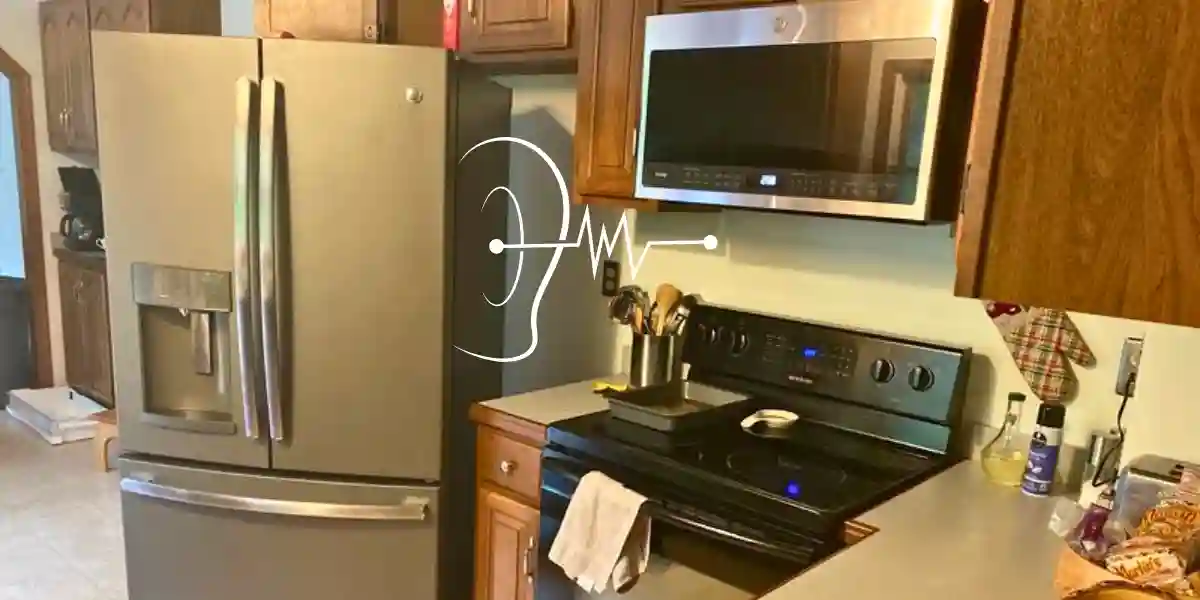
Experiencing a loud humming noise from your GE side-by-side refrigerator? This could be due to a few issues. The condenser fan motor might be faulty, causing friction and noise. Or, the evaporator fan blade could be hitting ice buildup. Regular maintenance and timely repairs can help.
This blog will quickly dive into the common reasons behind this issue, equipping you with practical solutions to bring back the silence in your kitchen.
Stay tuned!
Quick Overview of GE Side-by-Side Refrigerator Making Loud Humming Noise
Here are some most common reasons and solutions for a GE refrigerator making a loud humming noise:
Obstructed Evaporator Fan Blade
The evaporator fan blade, responsible for recirculating cold air, can make a loud humming noise if obstructed by ice or debris.
To fix this issue:
- Locate the evaporator fan blade at the back of the refrigerator.
- Check for any obstructions and remove them carefully.
- If there is excessive ice buildup, defrost the freezer to melt the ice.
Defective Condenser Fan Blade
The condenser fan, located at the back of the refrigerator, can also cause a loud humming noise if it is defective.
To resolve this issue:
- Inspect the condenser fan blade for any damage or obstructions.
- If the blade is damaged, replace it with a new one.
- Clean any debris or dust that may be affecting the fan’s performance.
Faulty Evaporator Fan Motor, Condenser Fan Motor, or Compressor
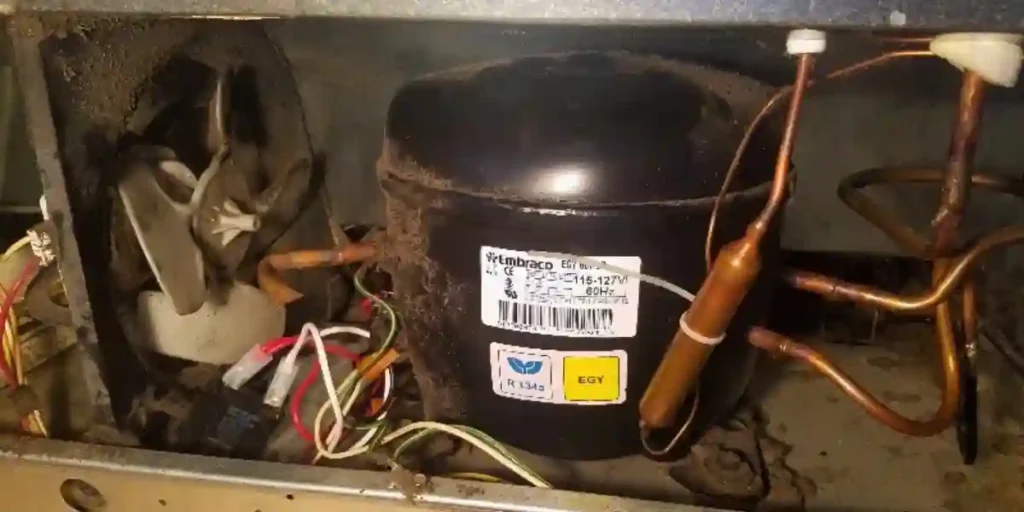
If the humming noise persists, it could be due to a faulty fan motor or compressor.
In this case, it is recommended to contact a professional technician to diagnose and repair the issue.
Lack of Water Supply to the Icemaker
If the humming noise is coming from the ice maker, it may be due to a clogged or frozen water supply line.
To fix this issue:
- Check the water supply line for any blockages or ice buildup.
- Thaw the line if necessary by using a hairdryer or placing warm towels on it.
- Ensure that the water supply line is properly connected and not kinked.
Vibrations
Sometimes, the humming noise can be caused by vibrations.
To reduce vibrations and minimize noise:
- Ensure that the refrigerator is level and stable on the floor.
- Check if the refrigerator is touching any nearby objects or walls. If so, adjust its position to create some space.
In-Depth Reasons and Solutions for GE Side-by-Side Refrigerator Making Loud Humming Noise
Faulty Evaporator Fan Motor
Issue: The evaporator fan motor plays a pivotal role in maintaining the fridge’s temperature by circulating air over the coils.
If this motor is obstructed or wears out, it can produce a significant humming sound. This situation can lead to uneven cooling, possibly affecting food quality and leading to spoilage.
Solution: Inspect the evaporator fan motor for obstructions or damage. If faulty, replace it with a suitable model for your GE refrigerator. Ensure the refrigerator is unplugged during this operation to avoid electrical hazards.
Defective Condenser Fan Motor
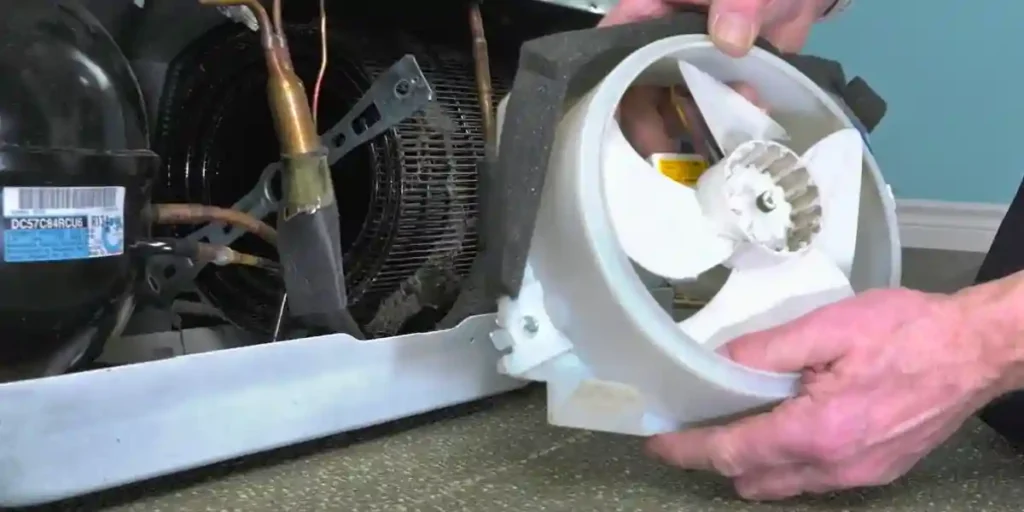
Issue: Located at the bottom near the compressor, the condenser fan motor expels heat from the compressor and cools the refrigerant.
Obstructions, debris, or motor malfunctions can emit a humming noise. This fault can heighten power consumption and reduce cooling efficiency.
Solutions: Turn off the power and clean or replace the condenser fan motor if needed. Remove any debris obstructing the fan blades, and ensure it’s properly aligned.
Compressor Issues
Issue: The compressor is vital to the fridge’s cooling mechanism. Though some noise is normal, abnormal humming could suggest internal component wear or lubrication necessity. The adverse effect could lead to compromised cooling capabilities.
Solutions: If the compressor is suspected, consult a technician for proper assessment, lubrication, or replacement. Compressor issues require professional expertise.
Loose or Vibrating Parts
Issue: Regular use can lead to parts like panels, screws, or mounts becoming loose. These vibrating parts, in contact with the refrigerator’s body or each other, can emit a humming sound. While it may not affect the refrigerator’s function, it can be a noise nuisance.
Solutions: Inspect and tighten any loose parts like panels, screws, or mounts that could be vibrating against the refrigerator’s body. Secure them properly to eliminate noise.
Ice Maker Malfunctions
Issue: For models with an ice maker, malfunctions such as trapped ice cubes or motor issues can lead to humming. This can disturb the regular ice cube supply and can impact the mechanism’s lifespan.
Solutions: For ice maker issues, try a manual reset according to the manual. If needed, consult a technician or replace the entire unit to restore proper ice production.
Drip Pan Vibrations
Issue: The drip pan, placed beneath the fridge, collects defrost water. If misaligned, it might vibrate against the fridge, producing a humming sound, though this doesn’t usually influence its water-collecting functionality.
Solutions: Ensure that the drip pan beneath the fridge is properly aligned and not vibrating against the fridge. Adjust it as needed to prevent noise.
Damaged or Misaligned Fan Blades
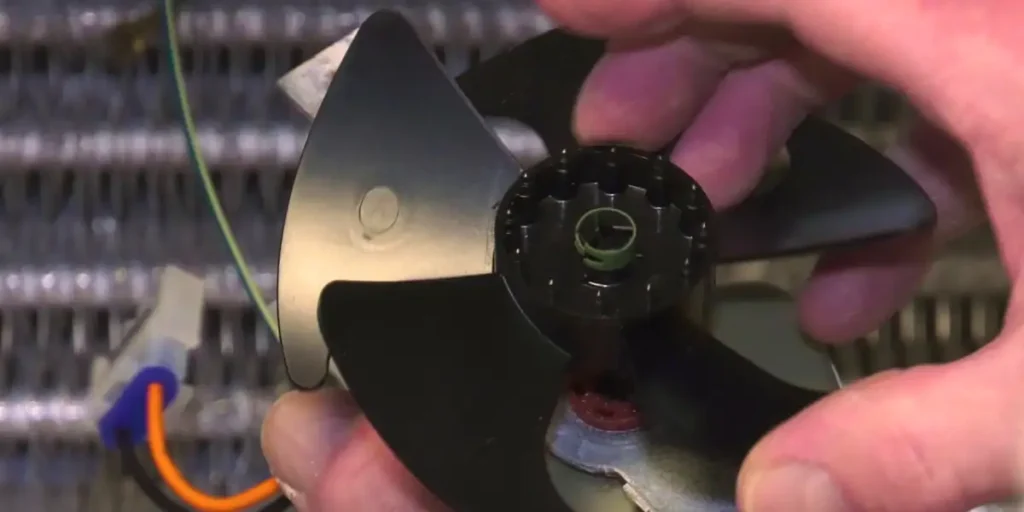
Issue: Both the evaporator and condenser fans can face issues if their blades are damaged or misaligned. Even minor dents can cause an imbalance leading to unusual vibrations and noises.
Solutions: Examine the fan blades of both the evaporator and condenser fans. If damaged or misaligned, replace or realign the blades to stop the noise.
Refrigerant Leak or Issue
Issue: The refrigerant is crucial for cooling. If there’s a leak or if it’s circulating improperly, it might produce a gurgling or humming noise. This will impact cooling efficiency and can increase electricity bills.
Solutions: If you suspect a refrigerant leak or improper circulation, consult a certified technician to repair the leak and recharge the refrigerant.
Age of the Refrigerator
Issue: Older models might have outdated components more prone to wear and
tear. This can result in higher noise levels, impacting comfort and possibly electricity consumption.
Solutions: For aging refrigerators, it might be more cost-effective to replace the unit with a newer, more energy-efficient model. Check for newer models that suit your needs and offer better energy efficiency and lower noise levels.
Overstuffing of the Refrigerator
Issue: An overstuffed refrigerator can obstruct air vents or press against internal components, causing a humming sound. This can also lead to improper air circulation, affecting cooling.
Solutions: Avoid overstuffing the refrigerator to prevent obstruction of air vents or pressure on internal components. Organize items to allow proper air circulation.
Damaged or Worn Out Start Relay
Issue: The start relay boosts the compressor. If damaged, it might fail to assist the compressor properly, causing the compressor to run continuously and make a humming noise.
This could cause the compressor to wear out prematurely.
Solutions: Replace the start relay if it’s damaged, as it could lead to the compressor running continuously. Consult a technician if unsure of the replacement part.
Capacitor Malfunction
Issue: The capacitor gives the compressor the initial boost to start. A malfunctioning capacitor can stress the compressor, leading to a humming noise, and can overheat the compressor.
Solutions: If the capacitor malfunctions, it needs to be replaced. This can be a complex task, so consult a certified technician to perform the replacement.
Diagnosing the GE Refrigerator to determine the noisy part
To diagnose which part of the GE refrigerator is causing the loud humming noise, you can follow these steps:
Check the Evaporator Fan Blade
The evaporator fan blade can become obstructed, causing a loud humming noise. To check and fix this issue:
- Locate the evaporator fan blade, usually at the back of the refrigerator.
- Inspect the fan blade for any obstructions or ice buildup.
- Remove any obstructions or thaw the ice if necessary.
Inspect the Condenser Fan Blade
The condenser fan blade can also be a source of loud humming noise. To diagnose and resolve this issue:
- Locate the condenser fan, usually at the back of the refrigerator.
- Check the fan blade for any damage or obstructions.
- Clean any debris or dust that may be affecting the fan’s performance.
Check the Compressor
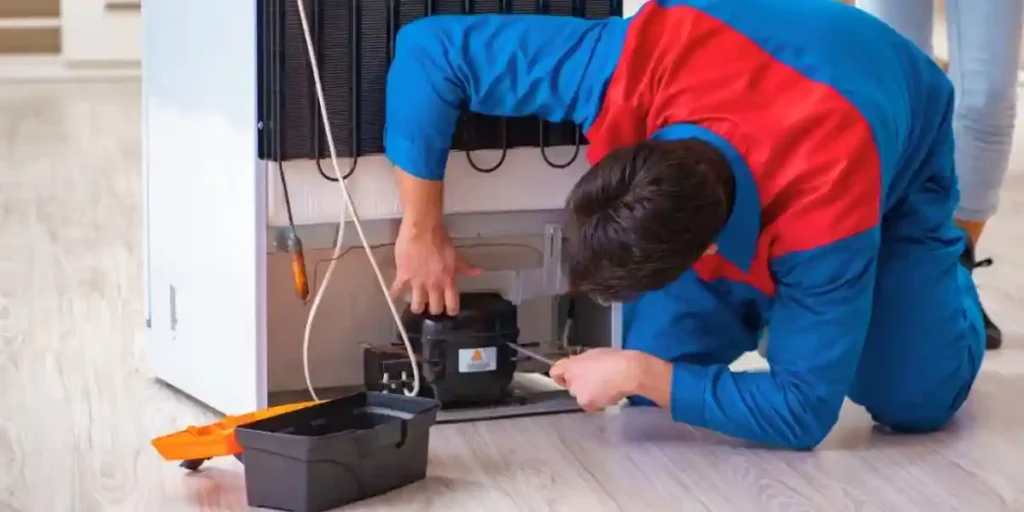
The compressor can sometimes be the cause of a loud humming noise. To diagnose this issue:
- Listen carefully to determine if the noise is coming from the compressor.
- If the noise is coming from the compressor, it may indicate a problem with its internal components.
- In this case, it is recommended to contact a professional technician for further diagnosis and repair.
Inspect the Water Inlet Valve
If the humming noise is related to the ice maker or water dispenser, the water inlet valve may be the culprit. To diagnose and fix this issue:
- Check the water inlet valve for any signs of damage or malfunction.
- Replace the water inlet valve if necessary.
Consider other Common Causes
There can be other factors contributing to the loud humming noise, such as loose components or vibrations. To address these issues:
- Check for any loose parts or panels in the refrigerator and tighten them if needed.
- Ensure that the refrigerator is level and stable on the floor.
- Check if the refrigerator is touching any nearby objects or walls and adjust its position to create some space.
Maintenance Tips to Prevent GE Side-by-Side Refrigerators from Making Loud Humming Noise
Clean the Fan Blades
The fan blades in both the evaporator and condenser are critical for cooling. If these are dirty, bent, or cracked, they can emit loud sounds.
This can happen due to accumulated dust, debris, or general wear and tear, leading to inefficient cooling and increased energy consumption.
Check the Leveling Legs
Uneven leveling legs can cause the fridge to wobble or vibrate. This is not only a noise issue but can put extra strain on other components, leading to more serious problems in the future. Regular checks can prevent this problem.
Inspect the Drain Pan
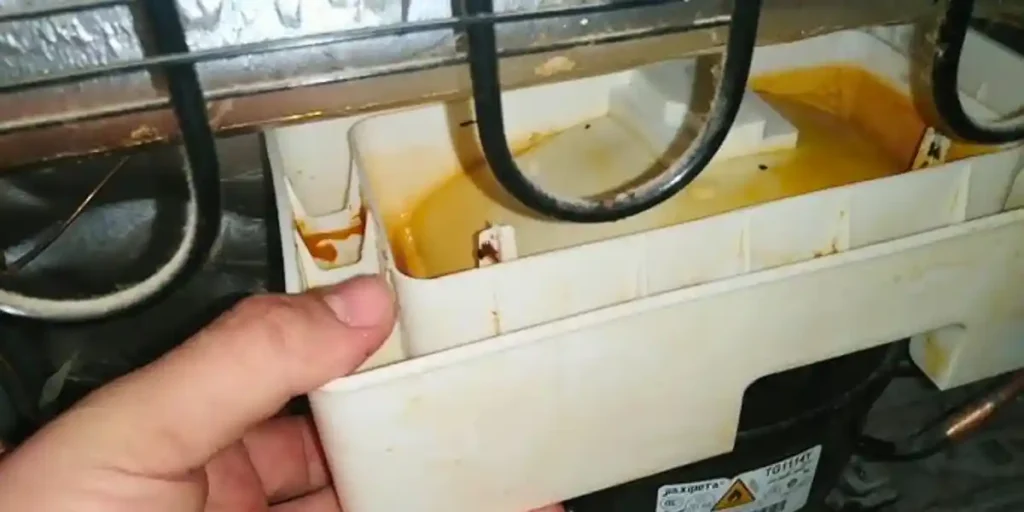
The drain pan positioned under the fridge could also be the culprit. A cracked or vibrating pan could create a noise that might be confused with a humming sound. This could cause water leakage, possibly damaging the floor underneath.
Check the Water Lines
The water lines that are leaking or bent can make a peculiar noise. These tubes at the back might become faulty due to poor installation or age, leading to water wastage or potential damage to the appliance.
Look at the Compressor
The compressor is vital for the cooling process. If it becomes damaged or worn out, it can create loud noises. This might be a sign of more significant mechanical failure, which can severely impact the refrigerator’s efficiency.
Clear the Door Seals or Gaskets
Door seals or gaskets can become worn over time or accumulate dirt. This can lead to noise as the doors close or while the compressor is running. It might also cause cold air to escape, leading to energy inefficiency.
Check the Thermostat’s Temperature Settings
The thermostat’s temperature settings could cause humming if set too high or low. These incorrect settings might affect the longevity of the food stored inside, making it spoil faster.
Change the Ice Maker
The ice maker in the fridge, if faulty, can emit noise. This could be due to multiple factors like misalignment or electrical faults and may lead to the inability to produce ice.
Inspect the Electrical Connections
Electrical connections if loose can create a humming sound. This not only contributes to the noise but can be a significant safety hazard, posing a risk of electrical shock.
Check the Interior Drawers and Shelves
Interior drawers and shelves if misplaced can cause a rattling noise. While not a severe issue, this can lead to difficulty in closing the doors, which might let the cold air escape.
Look out Loose Screws
Loose screws in the interior or exterior of the fridge can create noise. These might come loose over time, and if overlooked, can cause structural problems in the long run.
FAQs
Can the loud humming noise damage my GE refrigerator?
Will GE provide support if my side-by-side refrigerator is making a loud humming noise?
What parts commonly cause a GE refrigerator to hum loudly?
Can the loud humming noise in my GE side-by-side refrigerator lead to higher electricity bills?
Conclusion
Whether your GE side-by-side refrigerator is making a loud humming noise due to a faulty fan blade, a worn-out motor, or vibrations, diagnosing the issue is the first step in solving it. Some problems can be easily fixed at home, but others may require professional intervention.
Take the necessary steps to bring back a quieter, more efficient appliance, and if all else fails, consider investing in a newer model.